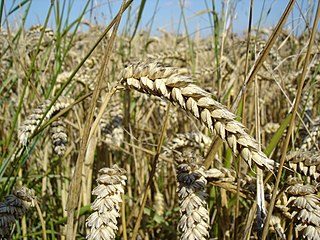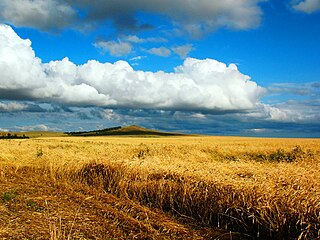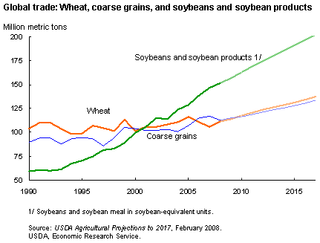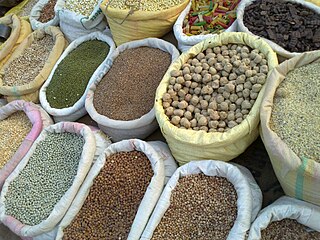Related Research Articles

A cereal is any grass cultivated for the edible components of its grain, composed of the endosperm, germ, and bran. Cereal grain crops are grown in greater quantities and provide more food energy worldwide than any other type of crop and are therefore staple crops. Edible grains from other plant families, such as buckwheat, quinoa and chia, are referred to as pseudocereals.

The economy of Nepal is developing category and largely dependent on agriculture and remittances. An isolated, agrarian society until the mid-20th century, Nepal entered the modern era in 1951 without schools, hospitals, roads, telecommunications, electric power, industry, or civil service. The country has, however, made progress toward sustainable economic growth since the 1950s. The country was opened to economic liberalization, leading to economic growth and improvement in living standards when compared to the past. The biggest challenges faced by the country in achieving higher economic development are the frequent changes in political leadership, as well as corruption.

Wheat is a grass widely cultivated for its seed, a cereal grain that is a worldwide staple food. The many species of wheat together make up the genus Triticum; the most widely grown is common wheat. The archaeological record suggests that wheat was first cultivated in the regions of the Fertile Crescent around 9600 BCE. Botanically, the wheat kernel is a type of fruit called a caryopsis.
IGC may stand for:
Trade can be a key factor in economic development. The prudent use of trade can boost a country's development and create absolute gains for the trading partners involved. Trade has been touted as an important tool in the path to development by prominent economists. However trade may not be a panacea for development as important questions surrounding how free trade really is and the harm trade can cause domestic infant industries to come into play.
The Foreign Agricultural Service (FAS) is the foreign affairs agency with primary responsibility for the United States Department of Agriculture's (USDA) overseas programs – market development, international trade agreements and negotiations, and the collection of statistics and market information. It also administers the USDA's export credit guarantee and food aid programs and helps increase income and food availability in developing nations by mobilizing expertise for agriculturally led economic growth. The FAS mission statement reads, "Linking U.S. agriculture to the world to enhance export opportunities and global food security," and its motto is "Linking U.S. Agriculture to the World."
The International Grains Council (IGC) is an intergovernmental organization which oversees the Grains Trade Convention and seeks to promote cooperation in the global grain trade. It’s tasked with enhancing market stability and world food security through providing impartial analysis on supply and demand fundamentals in the grains and oilseed sectors and improving transparency through regular reporting on market and policy developments.

Senbei are a type of Japanese rice cracker. They come in various shapes, sizes, and flavors, usually savory but sometimes sweet. Senbei are often eaten with green tea as a casual snack and offered to visiting house guests as a courtesy refreshment.
AWB Limited was a major grain marketing organisation based in Australia. Founded in 1939 by the Government of Australia as the Australian Wheat Board, in 1999 it became a private company, owned by wheat growers. It was acquired by Agrium in 2010.
The grain trade refers to the local and international trade in cereals and other food grains such as wheat, barley, maize, and rice. Grain is an important trade item because it is easily stored and transported with limited spoilage, unlike other agricultural products. Healthy grain supply and trade is important to many societies, providing a caloric base for most food systems as well as important role in animal feed for animal agriculture.
Daniel Gordon Amstutz was an American government official and business executive who played a prominent role during negotiation of the Uruguay Round of General Agreement on Tariffs and Trade rules on agriculture, and in the U.S. occupation of Iraq.

Agriculture in Kazakhstan remains a small scale sector of Kazakhstan's economy. Agriculture's contribution to the GDP is under 10% - it was recorded as 6.7%, and as occupying only 20% of labor. At the same time, more than 70% of its land is occupied in crops and animal husbandry. Compared to North America, a relatively small percentage of land is used for crops, with the percentage being higher in the north of the country. 70% of the agricultural land is permanent pastureland.
In different administrative and organizational forms, the Food for Peace program of the United States has provided food assistance around the world for more than 60 years. Approximately 3 billion people in 150 countries have benefited directly from U.S. food assistance. The Bureau for Humanitarian Assistance within the United States Agency for International Development (USAID) is the U.S. Government's largest provider of overseas food assistance. The food assistance programming is funded primarily through the Food for Peace Act. The Bureau for Humanitarian Assistance also receives International Disaster Assistance Funds through the Foreign Assistance Act (FAA) that can be used in emergency settings.

Agriculture is the largest employment sector in Bangladesh, making up 14.2 percent of Bangladesh's GDP in 2017 and employing about 42.7 percent of the workforce. The performance of this sector has an overwhelming impact on major macroeconomic objectives like employment generation, poverty alleviation, human resources development, food security, and other economic and social forces. A plurality of Bangladeshis earn their living from agriculture. Due to a number of factors, Bangladesh's labour-intensive agriculture has achieved steady increases in food grain production despite the often unfavorable weather conditions. These include better flood control and irrigation, a generally more efficient use of fertilisers, as well as the establishment of better distribution and rural credit networks.

World food prices increased dramatically in 2007 and the first and second quarter of 2008, creating a global crisis and causing political and economic instability and social unrest in both poor and developed nations. Although the media spotlight focused on the riots that ensued in the face of high prices, the ongoing crisis of food insecurity had been years in the making. Systemic causes for the worldwide increases in food prices continue to be the subject of debate. After peaking in the second quarter of 2008, prices fell dramatically during the late-2000s recession but increased during late 2009 and 2010, reaching new heights in 2011 and 2012 at a level slightly higher than the level reached in 2008. Over the next years, prices fell, reaching a low in March 2016 with the deflated Food and Agriculture Organization (FAO) food price index close to pre-crisis level of 2006.

A grain is a small, hard, dry seed – with or without an attached hull or fruit layer – harvested for human or animal consumption. A grain crop is a grain-producing plant. The two main types of commercial grain crops are cereals and legumes.

The Agricultural Market Information System (AMIS) is an inter-agency platform to enhance food market transparency and encourage international policy coordination in times of crisis. It was established at the request of the Group of Twenty (G20) in 2011. Countries participating in AMIS encompass the main producing and consuming countries of major food crops covered by the initiative: wheat, maize, rice and soybeans. AMIS is hosted by the Food and Agriculture Organization of the United Nations (FAO) in Rome/Italy and supported by a joint Secretariat, which currently consists of eleven international organizations and entities. Apart from FAO, these are the Group on Earth Observations Global Agricultural Monitoring (GEOGLAM) initiative, the International Fund for Agricultural Development (IFAD), the International Food Policy Research Institute (IFPRI), the International Grains Council (IGC), the Organisation for Economic Co-operation and Development (OECD), the World Food Program (WFP), the World Trade Organization (WTO), the United Nations Conference on Trade and Development (UNCTAD), the United Nations High-Level Task Force on the Global Food Security Crisis (UN-HLTF), and the World Bank.

A staple food, food staple, or simply a staple, is a food that is eaten often and in such quantities that it constitutes a dominant portion of a standard diet for a given person or group of people, supplying a large fraction of energy needs and generally forming a significant proportion of the intake of other nutrients as well. A staple food of a specific society may be eaten as often as every day or every meal, and most people live on a diet based on just a small number of food staples. Specific staples vary from place to place, but typically are inexpensive or readily available foods that supply one or more of the macronutrients and micronutrients needed for survival and health: carbohydrates, proteins, fats, minerals, and vitamins. Typical examples include tubers and roots, grains, legumes, and seeds. Among them, cereals, legumes, tubers, and roots account for about 90% of the world's food calories intake.

Kazakhstan–Mongolia relations refers to bilateral relations between Mongolia and Kazakhstan. Mongolia established diplomatic relations with the Republic of Kazakhstan on January 22, 1992.

The Initiative on the Safe Transportation of Grain and Foodstuffs from Ukrainian ports, also called the Black Sea Grain Initiative, is an agreement between Russia and Ukraine with Turkey and the United Nations made during the 2022 Russian invasion of Ukraine. The documents were signed in Istanbul on July 22, 2022.
References
 This article incorporates public domain material from the Congressional Research Service document: Jasper Womach. "Report for Congress: Agriculture: A Glossary of Terms, Programs, and Laws, 2005 Edition" (PDF).
This article incorporates public domain material from the Congressional Research Service document: Jasper Womach. "Report for Congress: Agriculture: A Glossary of Terms, Programs, and Laws, 2005 Edition" (PDF).